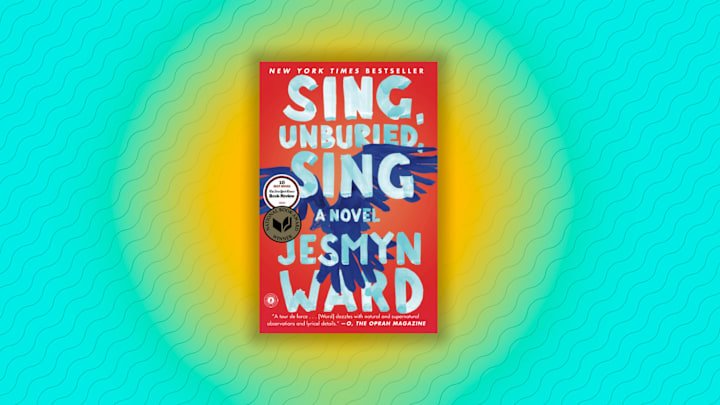Since its inception in 1950, The National Book Award in Fiction has recognized the best the world of literature has to offer. Dozens of influential authors have been honored for their achievements over the decades; here are some of the standouts.
1., 2., and 3. The Adventures of Augie March (1954), Herzog (1965), and Mr. Sammler’s Planet (1971) // Saul Bellow

Saul Bellow’s first National Book Award came in 1954 for The Adventures of Augie March, a picturesque novel in the Dickensian mold that follows the spirited exploits of the titular Augie March. In 1965, he won for Herzog, in which he gets into the corroding mind of an academic in crisis by partially telling the story through the unsent letters he writes to friends, family, and enemies alike. And in 1971, he won his final National Book Award for a story about a world-weary Holocaust survivor in Mr. Sammler’s Planet.
Buy it: The Adventures of Augie March, Herzog, Mr. Sammler’s Planet
4. and 5. Goodbye, Columbus (1960) and Sabbath’s Theater (1995) // Philip Roth

The recipient of two National Book Awards, author Philip Roth won his first in 1960 for Goodbye, Columbus, a novella about the issues that two young Jewish Americans from different classes face after embarking on a summer romance. Then, in 1995, he won for Sabbath’s Theater, a darkly comic novel about a depraved puppeteer searching for meaning in his autumn years.
Buy it: Goodbye, Columbus, Sabbath’s Theater
6. Them // Joyce Carol Oates (1970)

Them—you can almost hear the disgust in the title as author Joyce Carol Oates paints a version of America that is full of violence and desperation for the disenfranchised. Chronicling the ongoing tragedy of a dysfunctional working-class family in the middle of the 20th century, this is a book that will break your heart one moment and repulse you the next.
Buy it: Amazon
7. The Complete Stories // Flannery O'Connor (1972)

For the National Book Award’s 60th anniversary in 2009, the National Book Foundation held an online poll asking readers to vote for the best fiction title ever to win the award. Flannery O’Connor’s The Complete Stories came out on top, beating out works by authors like John Cheever, William Faulkner, and Ralph Ellison. Though O’Connor’s life was cut short when she died at the age of 39, she still managed to make an impact on 20th-century literature, and this 31-story collection captures her at her Southern Gothic peak.
Buy it: Amazon
8. Gravity’s Rainbow // Thomas Pynchon (1974)

Clocking in at over 700 pages and featuring a plot that can only be described as dense, Gravity’s Rainbow isn’t so much a book as it is an experience. It’s full of biting satire, intense paranoia, and plenty of conversations about death—and depending on who you ask, it’s either an unapproachable mess or the stuff of brilliance.
Buy it: Amazon
9. White Noise // Don DeLillo (1985)

Taking aim at everything from consumerism to pharmaceuticals to academia, Don DeLillo’s critically acclaimed satire White Noise was a biting dissection of 20th-century anxiety when it hit shelves in 1985 and is still just as relevant—if not more so—today. In addition to the National Book Award for Fiction, the book also earned a spot on TIME’s list of the 100 best English-language novels published from 1923 to 2005.
Buy it: Amazon
10. The Corrections // Jonathan Franzen (2001)

The Lambert family is beginning to fray: Alfred, the patriarch, is rapidly declining due to Parkinson’s disease, while his three children are all on the East Coast and dealing with failing careers, troubled marriages, and worsening mental health. Despite everyone’s private turmoil, Enid, Alfred’s wife, attempts to convince her children to come home for one last Christmas.
Buy it: Amazon
11. and 12. Salvage the Bones (2011) and Sing, Unburied, Sing (2017) // Jesmyn Ward

Author Jesmyn Ward has the distinction of being both the first woman and first person of color to twice win the National Book Award for Fiction, with Salvage the Bones and Sing, Unburied, Sing earning the honor in 2011 and 2017, respectively. In Salvage, Ward sets the story in the fictional town of Bois Sauvage, Mississippi, where an intimate family drama unfolds in the days leading up to Hurricane Katrina. The book was an outlet for Ward, who lived through Katrina, to meditate on the real-world tragedy of the storm and her dissatisfaction with how its aftermath was handled.
Sing, Unburied, Sing again takes place in Bois Sauvage—based on Ward’s home of DeLisle, Mississippi—and focuses on a young boy named Jojo and his family’s struggles while on the road in the rural South. In addition to praise from media outlets like The New York Times and TIME magazine, former president Barack Obama listed it as one of his favorite books of 2017.
Buy it: Salvage the Bones, Sing, Unburied, Sing
13. The Round House // Louise Erdrich (2012)

In The Round House, author Louise Erdrich journeys to the Ojibwe Native American reservation in North Dakota to tell a story about the ripple effects that one violent act has on the community. Confronting subjects like bigotry, injustice, and misogyny, the book is a microcosm of the larger issues facing society.
Buy it: Amazon
14. Trust Exercise // Susan Choi (2019)

Though Trust Exercise has all the trappings of a typical high-school drama, writer Susan Choi uses competing—and unreliable—narrators to explore how the different characters in the book perceive the truth. By building a narrative in the first half only to dismantle it later on, Choi leaves readers guessing until the end.
Buy it: Amazon
